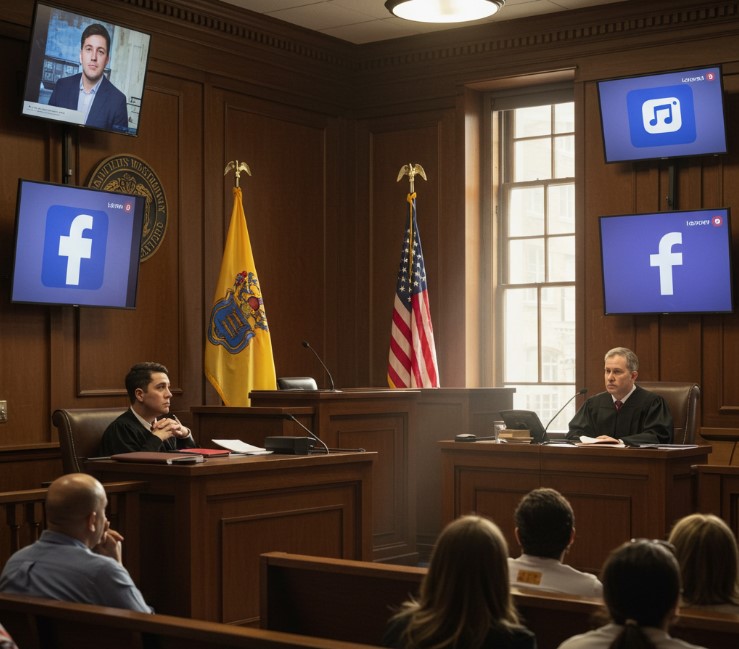By Dennis Galvin, Esq. and Jonathan E. Drill, Esq.
Planning Boards when hearing a development application and/or when conducting a hearing on a master plan adoption or amendment are acting in a “quasi-judicial” capacity. (While the master plan itself is a legislative document, the hearing on adoption or amendment of the master plan is subject to the same requirements as are hearings on development applications pursuant to N.J.S.A. 40:55D-10a so the Planning Board acts in a “quasi-judicial capacity in conducting the hearing.) Zoning Boards of Adjustment (with the exception of preparation and adoption of the annual report) always act in a “quasi-judicial” capacity. [1]
Let’s explore what this means. The dictionary definition of “quasi” is “having some resemblance” (Merriam-Webster Online Dictionary). Thus, the best way to understand “quasi-judicial” in a New Jersey zoning and land use context is to view a land use board like a court and view board members like Judges.
It has long been the law in New Jersey that board members acting in a quasi-judicial capacity when exercising powers granted to them to make land use decisions must make their decisions based on the evidence produced during the hearing and “uninfluenced by extraneous considerations which in other fields might have play in determining purely executive action.” Kramer v. Sea Girt Board of Adj., 45 N.J. 268, 280 (1965). So, what does a board member have to do to act like a judge?
First, you don’t have to wear a robe to be a judge. While you don’t have to wear a robe to be a judge, you should nevertheless dress appropriately for the position. Those appearing before, you especially professionals, owe you a duty to dress appropriately. The duty should be mutual. While unabated 90-degree heat will impact what’s worn when the weather is reasonable, men and women board members should be wearing a minimum of Friday business attire. Applicants would be wise to do the same but as we all know they don’t always understand that.
Second, being in some sense a Judge means you have to listen carefully to, and confine your decision to, the evidence. Judges and land use board members have a duty to listen carefully to all the testimony, to carefully examine all the evidence, to disclose any evidence of which you become aware that emanated from a source outside the record, and to base your decision on the evidence and only the evidence. If you learn something when you visit a site, you have a duty to put that on the record and give the applicant and objectors an opportunity to dispute what you learned. Baghdikian v. Ramsey Board of Adjustment, 247 N.J. Super. 45, 50-51 (App. Div. 1991). As the Baghdikian court explained: “If such facts are undisclosed the parties would be denied the essence of a hearing, they would be kept in ignorance of the things controlling the action of the board, and due process would be flouted.” Id. at 51. You should never do any independent research by looking something up in a book, newspaper or on the internet or you step out of your role as a Judge and become a witness. [2] It has long been the law in New Jersey that board members, “sitting in a quasi-judicial capacity, cannot be silent witnesses as well as judges.” N.J. State Board of Optometrists v. Nemite, 21 N.J. Super. 18, 28 (App. Div. 1952). Violating this rule will result in having to recuse yourself from involvement in the application or face being disqualified or worse – put the Board’s ultimate decision in jeopardy by subjecting it to a lawsuit and reversal. If you feel the record is inadequate you should request that the application be continued and that either the applicant, objector or board professional get the evidence you need to be in a position to be able to judge and decide the application.
Third, just like a judge you need to be prepared. All good judges are thoroughly prepared for a hearing and have read all papers and reports submitted. So should board members. Additionally, board members should visit the site. Just remember to put your observations made during the site visit on the record during the hearing and give the applicant and objectors an opportunity to dispute what you learned. Baghdikian v. Ramsey Board of Adjustment, 247 N.J. Super. 45, 50-51 (App. Div. 1991). Also, just like a judge, you can never pre-judge a case or make a statement about how you will vote in advance of hearing all the evidence produced during the hearing. Further, you should not have ex parte discussions about the merits of the case. Smith v. Fair Haven Zoning Board, 335 N.J. Super. 111, 120 (App. Div. 2000). If someone corners you and starts talking about the application while in the market, you should advise them that you cannot comment on a pending case. If you learn something in any ex parte interaction you must put it on the record. Smith v. Fair Haven Zoning Board, at 120. If you do comment in some way (even to get someone off your back), you must recuse yourself from any further involvement in the application. The Local Government Ethics Law at N.J.S.A. 40A:9-22.5d provides that no local government officer or employee (and board members are local government officers) shall act in his or her official capacity in any matter where he or she has a direct or indirect “personal involvement that might reasonably be expected to impair his [or her] objectivity or independence of judgment.” The discovery that a board member received and considered ex parte communications by an applicant, objector or other member of the public could lead a reasonable member of the public to believe that such communication constituted personal involvement by the board member that might reasonably be expected to impair the board member’s objectivity or independence of judgment.
Fourth, like a judge, you must respect the process. That is why we make all witnesses come to the front of the room stand up and present themselves. If the Board expects applicants, objectors and witnesses to be respectful of the Board, board members must show respect to them, just like a Court does. If a proceeding before a board lacks recognized elements of a judicial inquiry and impartiality, it may be set aside. Hill Homeowners v. Passaic Zoning Board of Adj., 129 N.J. Super. 170, 179 (Law Div. 1974). Suggestions: Don’t speak over a witness; Don’t fight with a witness. What is the point anyway? You decide the case. Even if you find the evidence to be insufficient to support a requested variance you may never be able to get an applicant or her professional to agree. Be polite, listen attentively, and when you get to deliberations explain why you don’t agree with their argument. At that point they are not permitted to respond.
Fifth, listening is the hardest part of being a Judge and a Board Member; yet is arguably the most important attribute. When it is most likely that you will not agree with an applicant, the public or an objector, you should give them more latitude to speak. The rule of law is based on fairness. Nothing inclines people to believe that you have acted fairly than when you have shown great patience by listening to everything they have to say. A reviewing court will recognize your effort as well. When you make a decision that goes against an applicant or an objector, explain that you listened to the arguments made but disagree with the arguments. And, explain your reasons.
Sixth, formality is necessary in Court and before a Board. It is important to observe formalities and maintain order during a hearing. There are professionals and applicants who routinely appear before the Board. Of course, you get to know these individuals on first name basis; but when there is public present it is critical that you refer to them by their last name preceded by a Mr. this or a Ms. that. Using first names makes it look like the fix is in. The goal is to assure the public that the hearing is fair. If you appear too familiar with the applicant or his lawyer it sends a bad message. On a similar note, even if you are friendly with these individuals, avoid talking to them off the record in the public’s presence. In other words, even if they come up to dais before the meeting to talk about the Mets, the public may well think you are talking about the hearing. Remember that, just like a Judge, you can only discuss a case during the hearing. By way of observation it is unnerving for a lawyer to go to a judge’s chamber and see his or her adversary is already there, and yucking it up with the Judge. The same thing holds true for Boards. Don’t chat up the applicant or the attorney when the public can see.
Seventh, both a Court and a Board need to maintain congeniality and respect among its staff and its members. The goal of the Board is to decide the matter before the Board. As part of that goal the Board must give everyone a fair opportunity to be heard and that includes the minority opinion of board members. Treating your fellow board members and staff with respect is critical. Board members and staff are expected “to maintain a deportment appropriate to a public meeting of a local government entity.” Dore v. Bedminster Board of Ed., 185 N.J. Super. 447, 454 (App. Div. 1982). There should be nothing political about a Board decision. Often the Board decision is unanimous but, at times, there are majority and minority opinions and split votes. While the majority and the minority have both heard the same witnesses, each side may draw different factual truths from the testimony or, even if they both believe the same facts, each side may draw different conclusions from those facts. There is absolutely no reason to belittle or besmirch a fellow board member. Just support your opinion with the facts as you find them. And, never throw your fellow board members or staff under the bus following the hearing. Making a decision is hard for everyone whether they tend to vote for or against variance relief. All board members are volunteers and should be acting responsibly and trying their best. If the Governing Body thinks certain board members are not deciding cases as they should it is their duty to replace them. If the board is having issues with staff, those issues should be addressed behind the scenes and, if they cannot be resolved, the staff should be replaced. Making a public spectacle does not help and does not earn the respect of the public.
Eighth, Judges and Board Members never comment to the Press, even after the application is decided. Judges never talk to the press about a case and neither should board members talk to the press about an application, whether before, during or after the hearing and decision. If a reporter is doing his or her job they should be attending the hearing and anything you say on the record is fair game. But you should not talk to reporters before, during or after the hearing. That includes posting stuff on the internet, Facebook or on the blogosphere. The inherent problem is that applications often return to boards and occasionally wind up in court. Once you comment publicly outside the hearing you are tainted and cannot sit on a future application involving an amendment or a remand or, perhaps, a different application but made by the same applicant. Keep your remarks on the record only. If you want more to say about your community’s development pattern, run for office and resign your quasi-judicial position. Quasi-judicial actors decide applications on the facts presented.
Ninth, don’t abuse your authority. It is never appropriate to ask for a fire truck. It is also not responsible to ask for extra experts or extra information when you know that the additional experts or extra information are not necessary for you to have the information you need to vote on the application. We are not saying you should never ask for things that improve the application or are necessary for you to have the information you need to properly vote on the application, but you have to be fair to objectors and applicants alike. It costs a lot of money to file an application, to engage professionals, and to provide public notice of the application. You must ask for what you need. But don’t cause the applicant to endure unnecessary expense. Most applicants are willing to delay hearings and to carry notice; but, again, don’t do that unless you have good cause to do so.
Tenth, don’t sit when you have a conflict of interest. A competent Judge will never hear a case when he or she has a conflict of interest even when they have and neither should board members. Whenever you suspect you might have an actual conflict or an appearance of a conflict (a situation where there is no actual conflict but a situation where a member of the public may reasonably question whether you could hear a particular application without being biased in favor or against the application), you should consult the board attorney. There are times when preserving the integrity of the process requires you to just recuse yourself even if it does not amount to a violation of the Local Government Ethics Law. Sometimes it is best to recuse yourself out of an abundance of caution. As one of the authors likes to say: “When in doubt, step out.” Boards have between two (2) to four (4) alternates; use them.
Finally, if you recused, you can no longer sit with the Board at all on that matter. This prohibition includes the Chairperson.
[1] Courts typically use the labels “quasi-judicial” and “quasi-legislative” when determining whether an agency is obligated to provide an administrative hearing. I/M/O Proposed Quest Academy Charter School, 216 N.J. 370, 384 (2013). In New Jersey, Planning Boards and Zoning Boards of Adjustment are required to provide an administrative hearing on all applications for development and Planning Boards are required to provide an administrative hearing on proposed adoptions and amendments to the master plan. See, N.J.S.A. 40:55D-10a and -28. As such, there is no question that these boards act quasi-judicially in those regards.
[2] The co-authors disagree on this point. Mr. Drill believes that a board member should not use Google or other on-line resources at all. Mr. Galvin believes that Google or other similar on-line resources can be used but for purposes of board members asking questions of witnesses and provided such usage is disclosed on the record (and such usage should also be disclosed to the Board Attorney).
Dennis M. Galvin, Esq. is an attorney with Davison, Eastman, Muñoz, Paone. Jonathan E. Drill, Esq. is an attorney with Stickel, Koenig, Sullivan & Drill, LLC.











